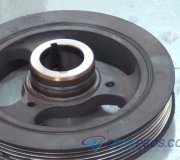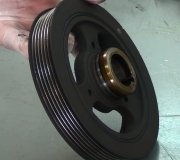I think you identified the problem without realizing it. But first of all, clarify where you're getting that 6 volts. That can't be at the battery because the engine and fuel pump wouldn't run. If you're getting that at the generator's output terminal, you can't have a different voltage there than at the battery, ... Unless there's break in that circuit, which is what you're fixing temporarily with your ten-gauge wire. You also got 21 volts once. I know THAT wasn't at the battery. It could only be at the generator.
This goes back to another reply I posted today about a fellow who removed the battery cable to see if his generator was working. (REAL bad idea). In effect, the same thing is happening to your car with the break in the wire going back to the battery. The break isolates the battery from the generator with its built-in voltage regulator. The battery is the key component in helping the voltage regulator maintain a safe system voltage. I did a demonstration every year for my students to show that without a battery connected, it is real easy for the generator to produce in excess of 30 volts. That will destroy computers and any light bulbs that are turned on, but in your case that high voltage isn't making it to the car's electrical system. You would have seen lights getting REAL bright. What WILL happen is that high voltage will still be seen by the generator and that will take out the internal voltage regulator and diodes. Once one of the six diodes shorts, the generator will only be able to develop exactly one third of its rated current. The most common ones are 90 amp generators, and 30 amps is not enough to run the entire electrical system under all conditions. The six volts indicates the voltage regulator was destroyed and it's not allowing any current to flow through the field winding to produce a magnetic field.
I suspect the six volts you're measuring is not coming out of the generator. I think that's what you're seeing from the battery. Regardless, leave the engine off, then measure the voltage at the generator's output terminal. If you find 0 volts, great; you've proven there's a break in the wire. If you find full battery voltage, all it takes is one tiny strand of wire to be all that's left in a break for enough current to get through that the voltmeter can pick it up. You need to cause a higher current to go through the break to make it have a greater affect. The first thing to try is a test light instead of a digital voltmeter. This is one case where the cheaper the test light, the more accurate it will be compared to a voltmeter. Clip the test light on so you don't have to hold onto it, then follow the output wire back to the battery. Wiggle and tug on it. If you see the test light go out, you found the suspect area.
GM likes to use the larger starter terminal as a convenient tie point so you'll probably end up down there. There will be short lengths of "fuse link" wire spliced in. You test those by tugging on them. If they're good, they'll act like a piece of wire. If they're burned open, they'll act like a rubber band.
Tuesday, February 26th, 2013 AT 3:23 AM




